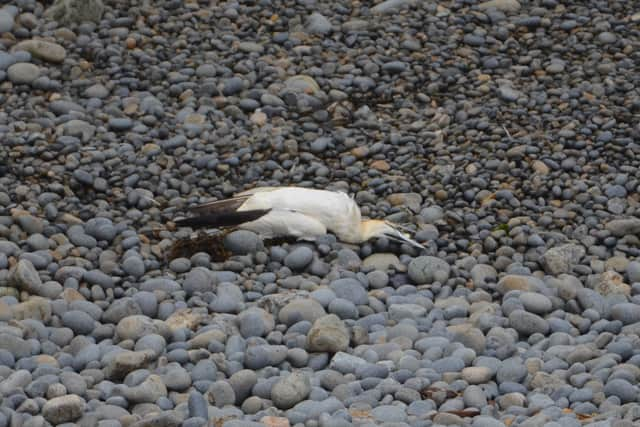Wildlife Trusts: UK seabirds devastated by bird flu in 2023 - but whales and dolphins show signs of recovery
and live on Freeview channel 276
Bird flu has had a devastating impact on the UK's seabird colonies this year, wiping out thousands of birds - but 2023 has brought better news for whales, dolphins, and fish.
The Wildlife Trusts’ annual marine life roundup has revealed that over the last two years the UK has experienced its most severe avian influenza - or bird flu - outbreak since the virus first emerged from a Chinese poultry farm in the 1990s. Vast numbers of wild birds have died, with the only nesting tern colony in Wales, at Cemlyn Nature Reserve, halving in size since last year.
Advertisement
Hide AdAdvertisement
Hide AdHundreds of dead kittiwakes, herring gulls and guillemots washed up along the coast of Aberdeenshire this year, while over 1,000 dead birds were removed from beaches in Pembrokeshire in July. Dorset Wildlife Trust also found 600 mostly dead sandwich and common terns and black-headed gulls on Brownsea Island during the breeding season. The RSPB recently reported that in their reserves, 21 of the UK’s 25 breeding seabird species have now tested positive for the virus.
It isn't all bad news for seabirds, however. The Wildlife Trusts said there has been some cause for optimism, with northern gannets that have black instead of pale blue-coloured eyes are more likely to be immune to the virus, while monitoring on Alderney near Guernsey suggests there has been no bird flu on the island this year.


Other marine species were faring better, the roundup found, and appeared to be recovering around the British Isles. A notable example was the Atlantic bluefin tuna, which was fished almost to extinction in the 20th century. The species has recently been seen off the Devon and Cornwall coasts, and in Scotland.
Dolphins and humpback whales have also been making comebacks. There were multiple sightings of the marine mammals in so-called bait ball feeding frenzies, when predators force fish into a tight ball near the surface to trap them. Such a large volume of sightings could be a sign that the populations were starting to recover, after decades of being hunted by humans.
Advertisement
Hide AdAdvertisement
Hide AdThe Wildlife Trusts' head of marine conservation, Dr Lissa Batey, told PA that regulation remained vital for protecting the natural world, and reversing wildlife declines. “The end of commercial whaling has brought humpbacks and fin whales back to UK waters, and measures to protect bluefin tuna has led to a spike in sightings," she said.
“This fantastic fish has returned from the brink of extinction and the risk of decimating the population for a second time remains high, so it is vital that commercial fishing quotas are set realistically and rigorously enforced. When we give nature space, wildlife can recover, it’s as simple as that," she continued.
Dr Batey said the UK needed to act faster to reach its target, of protecting 30% of its seas by 2030. Other threats to marine life also need to be resolved, such as that from pollution from sewage, plastic and industrial processes, The Wildlife Trusts said.
This year also saw the introduction of highly protected marine areas, in Allonby Bay, Cumbria, Dolphin Head, Sussex and northeast of Farnes Deep, in the North Sea, where destructive practices like trawling are banned. However, The Wildlife Trusts said there needed to be a massive expansion if the protected areas are to have any serious impact - as they currently cover just 0.4% of English seas.
Advertisement
Hide AdAdvertisement
Hide Ad“This new gold-standard of protection will stop all damaging activities such as trawling and enables marine wildlife to recover, benefiting fishers and carbon storing habitats," Dr Batey added. “These special places cover less than half a percent of English seas, so it’s a tiny first step towards more designations.”
Comment Guidelines
National World encourages reader discussion on our stories. User feedback, insights and back-and-forth exchanges add a rich layer of context to reporting. Please review our Community Guidelines before commenting.
